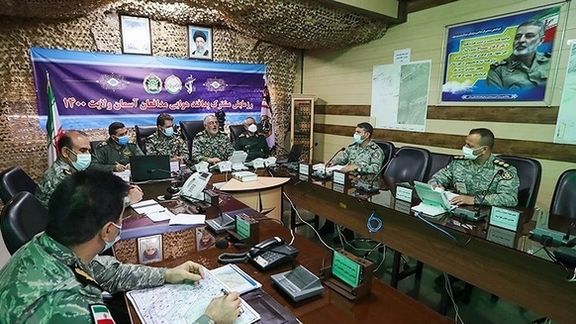Washington Think-Tank Mulls Options If Iran Nuclear Talks Falter

With more voices calling for a US ‘plan B’ if the Iran nuclear talks fail, the Washington-based Middle East Institute hosted Friday a Zoom discussion.

With more voices calling for a US ‘plan B’ if the Iran nuclear talks fail, the Washington-based Middle East Institute hosted Friday a Zoom discussion.
Norman Roule, advisor at the advocacy group United Against Nuclear Iran and a former officer in the Central Intelligence Agency, and Mohammad Al Sulami, President of the Riyadh-based International Institute for Iranian Studies, both argued that the US should tighten implementation of existing sanctions.
Both asserted that Iran is now selling 1.3 million barrels of oil daily, despite US ‘maximum pressure’ sanctions that threaten punitive action against any third party buying Iranian crude or dealing with its central bank.
With the 2015 nuclear deal, the JCPOA (Joint Comprehensive Plan of Action) dead, Roule argued, Beijing was benefiting unduly from its political and military neutrality.
“China, is part of the problem…Iran sells about 1.3 million barrels of oil a day and much of this goes to China,” Roule said. “The money that does make it back from those sales…is funding the missile industry [in Iran] and is funding the militia industry – not in its entirety, but it’s part of the general budget that funds those two organizations. If a missile lands in Saudi Arabia, it’s not unreasonable to think that some Chinese money has enabled that missile to be given to the Houthis [Ansar Allah, Yemenis].”
Integrated approach
Sulami claimed there was no support in the region for “returning to the JCPOA as it is,” and pointed to recent public disagreement between visiting US President Joe Biden, who says he is committed to talks aimed at reviving the JCPOA, and Israel prime minister Yair Lapid.
While Sulami wanted existing sanctions enforced – presumably by US action against Chinese buyers – he ruled out more sanctions.
A different, integrated approach was needed, he argued. “For the United States, the nuclear issue is the priority. For Europe, the missile program [of Iran] is important… these countries are within reach of Iranian missiles. For regional counties these two files…have to be dealt with, but the threat we are experiencing …is the Iranian behavior in the region, the proxies, the militias, the Houthis, Iraq, Syria and other places. That is the main, immediate threat.”

Sulami conceded that comprehensive talks with Iran over all such matters could take two to three years. “Of course, we support reaching an agreement…we want a very good relationship with Iran. The [Saudi] Crown Prince [Mohammad bin Salman] has said this more than once … Plan B should be to bring Iran back to the table of negotiation with hope …this will be a win-win situation for everybody.”
‘Enough is enough’
Sulami cautioned against military confrontation. “Nobody is supportive of that, specifically regional countries – nobody wants more wars in the region – enough is enough.” He added that “tit-for-tat” conflict – presumably meaning low-key engagement – had “benefit for Iran and gets more support for the political system inside the country.”
It was also important, Sulami noted, for Arab leaders to continue to “normalize” with the “Syrian regime,” bringing it back after “reforms” into the Arab League and so prevent Iran “spreading the ideology, spreading Shi’ism, spreading drugs through the IRGC [Revolutionary Guards].”
Among other recent advocates of a ‘plan B,’ historian John Ghazvinian argued in the Los Angeles Times that the JCPOA was a “roadblock” that should be replaced by “broader, deeper and more comprehensive negotiations with Iran.”
The British ambassador to Iran Simon Shercliff in a tweet Friday, after visiting companies in Shiraz, called on British firms to boost trade “JCPOA or not.” While the United Kingdom alongside France and Germany has moved closer to the US under the Biden administration, it does not accept US third-party sanctions as legitimate.